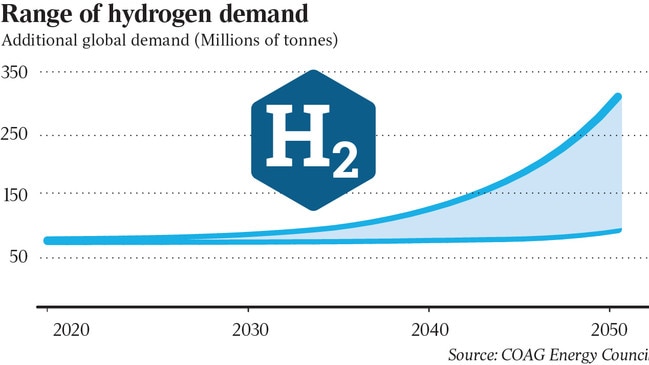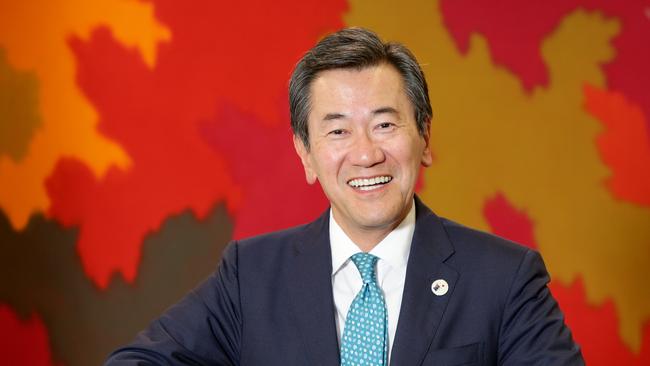Hydrogen exports to Japan set to boom amid carbon neutral push
Hydrogen shipments from Australia to Japan could eventually rival the post-war boom in coal trade between the two countries, according to Japan’s new ambassador.
Hydrogen shipments from Australia to Japan could eventually rival the post-war boom in coal trade between the two countries, according to new Japanese ambassador Shingo Yamagami.
Mr Yamagami said Australia was set to become a major source of hydrogen for Japan as it moved to a carbon-neutral economy by 2050. “All the big trading houses in Japan are interested in developing hydrogen,” he said. “Australia is well placed as a source of hydrogen because of its long-tradition of shipping energy and raw minerals to Japan.”
Japan’s move to shore-up Australia as a secure source of renewable energy comes amid warnings from Mr Yamagami about the threats posed by an increasingly “assertive” China in the Asia Pacific.
Japan’s energy supply has become less certain following the 2011 Fukushima nuclear disaster that made it more reliant on imports of fossil fuels such as oil, gas and coal.
Mr Yamagami said the first big shipment of hydrogen to Japan from Australia was set to occur later this year. Japan is planning to build a “hydrogen economy” that by 2030 will require it to procure 300,000 tonnes of the gas each year.

Australia meanwhile is increasingly looking to allies such as Japan for support as it remains locked in an acrimonious trade war with China that threatens to undermine exports of commodities including coal, wine and barley.
His comments came as Australia delivered a record trade surplus of $10.1bn was recorded in January, according to Australian Bureau of Statistics figures. The previous record was $9.6bn in March 2020. Exports rose by 6.2 per cent in the month while imports fell by 2.3 per cent.
Much of the growth has been driven by a surge in the value of iron ore.
Australia and Japan are co-operating on the Hydrogen Energy Supply Chain (HESC) project in Victoria, which is making progress towards establishing the world’s first international liquid hydrogen supply chain.
The project aims to safely produce and transport clean liquid hydrogen from the Latrobe Valley in Victoria to Kobe in Japan. As part of the project, liquid hydrogen will be transported by a specially designed hydrogen marine carrier ship to Japan.
The Federal Government last year outlined plans to build an Australian hydrogen industry that could generate about 8,000 jobs and about $11 billion a year in GDP by 2050.
Separately, the Queensland government has established a $15 million industry fund to support hydrogen projects in the state as it moves to take advantage of export opportunities.

Mr Yamagami said that as well as forging tighter energy links, the two nations were set to establish closer security ties in the coming years to meet challenges in the Asia Pacific region, including an increasingly assertive China.
“Australia is an indispensable part of Asia,” he said. “I would consider Australia to not just be a middle power but a global power with an agile defence force and intelligence apparatuses.”
He said the rise of China as an economic superpower presented both “challenges and opportunities” for the region.
China is Japan’s biggest trading partner with Japanese companies having a large presence in the country, but Beijing had to be encouraged not use trade as a “political tool.”
He said he felt “sympathy” for Australia over its current trade frictions with China because Japan had experienced a similar situation a decade ago.
In 2010, China restricted exports of rare earths to Japan when the two nations were at odds over a territorial dispute in the East China Sea.
Mr Yamagami said Japan had responded to the dispute by reducing its reliance on China for its rare earth supply from 90 per cent to about 60 per cent.
Chinese authorities threatened and imposed a variety of restrictions on Australian imports in 2020, including on meat, wine, seafood and timber amid rising tensions between the two nations over alleged political interference by Beijing in Australia’s internal affairs. Australia in mid-December referred China to the World Trade Organisation over its barley tariffs.
“We know Australia is going through some pain and suffering at the moment and if we can help with our own experience we will,” he said. “We are one of the great partners with Australia and have worked hard to earn trust. We are here for the long term.”
Mr Yamagami said Australia’s effective handling of COVID-19 meant it had emerged as an attractive destination for Japanese investment including in real estate, space and infrastructure.
Japanese corporate investment in Australia soared to a record $26bn in 2019, including Mitsubishi UFJ Trust and Banking Corporation’s $4.2bn acquisition of Colonial First State Global Asset Management and Nippon Paint’s $3.8bn takeover of paint manufacturer Dulux.


To join the conversation, please log in. Don't have an account? Register
Join the conversation, you are commenting as Logout